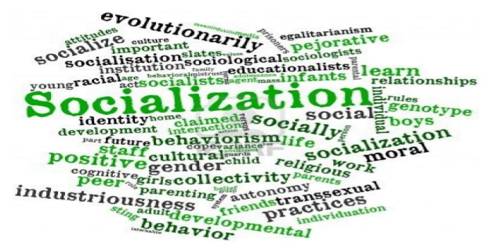Socialization is known as the process of inducting the individual into the social world. It is the means by which human infants begin to acquire the skills necessary to perform as functioning members of their society. The term socialization refers to the process of interaction through which the growing individual learns the habits, attitudes, values, and beliefs of the social group into which he has been born.
Gender Socialization
Gender socialization is the process of learning the social expectations and attitudes associated with one’s sex. Sociologists explain through gender socialization why human males and females behave in different ways: they learn different social roles. For example, girls learn to do different household chores than boys; girls learn to bake and clean, and boys learn to mow lawns and take out the garbage.
Henslin contends that “an important part of socialization is the learning of culturally defined gender roles.” Gender socialization refers to the learning of behavior and attitudes considered appropriate for a given sex. Boys learn to be boys and girls learn to be girls. This “learning” happens by way of many different agents of socialization.
A parent plays a very significant role in gender socialization. Sociologists have identified four ways in which parents socialize gender roles in their children: Shaping gender-related attributes through toys and activities, differing their interaction with children based on the sex of the child, and communicating gender ideals and expectations.
As parents are present in a child’s life from the beginning, their influence in a child’s early socialization is very important, especially in regards to gender roles. Sociologists have identified four ways in which parents socialize gender roles in their children: Shaping gender-related attributes through toys and activities, differing their interaction with children based on the sex of the child, serving as primary gender models, and communicating gender ideals and expectations.
The main agents of gender socialization are parents, peer, siblings, school, society, and religion. For very young children parents and family play the central role in shaping gender socialization. They determine how the family interacts with a boy as well as the types of toys and clothes that the baby is given.
Gender identity is established by age of two years. Its central component is the notion – I am male or I am female. Sigmund Freud theorized that identification and imitation of same-sex parents lead to effective gender –identity formation. In the latency period males and females tend to aggregate themselves from each other. This may be considered part of the socialization process and further solidifies gender identification and role-specific behavior. Schools and families continue to influence gender socialization throughout adolescence. During adolescence, peer influence becomes the strongest agent of gender socialization as teens form together in small social groups to facilitate their transition into adulthood and into the larger society. The socializing effects of the mass media also become powerful in formative years.
Information Source;
















